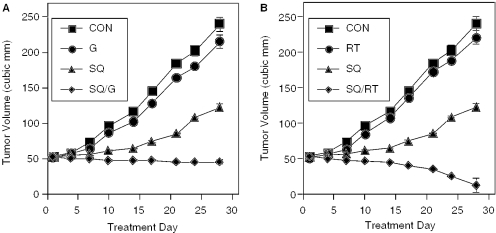Figure 3.
Squalamine inhibits growth of human non-small cell lung tumor cells and enhances the antitumor effects of radiation therapy and genistein. Lung cancers with estrogen receptor-α and estrogen receptor-β expression (NCI-H23) were grown as subcutaneous xenografts to 50–100 mm3 in size in ovariectomized, nude mice primed with estrogen (1.7 mg/pellet). Mice were then treated as outlined here. (A) Genistein, a phytoestrogen, and squalamine inhibit growth of human lung tumor xenografts NCI-H23 in nude mice. Mice with established tumors were treated with control solution, genistein alone (0.2 mg/kg s.c. on alternate days) (18), squalamine alone (2 mg/kg s.c.) on days 1–10, or genistein with squalamine. By 28 days, tumors showed little tumor regression after treatment with genistein alone and modest regression after squalamine alone compared to control (P < 0.05). More profound tumor growth inhibition was elicited by treatment with squalamine plus genistein (P < 0.001). Mean tumor volumes of control (CON), genistein (G), squalamine (SQ) and combined squalamine/genistein (SQ/G) treatment are shown. (B) Radiation therapy (RT) and squalamine inhibit growth of lung tumor xenografts NCI-H23 in nude mice. Mean tumor volumes of control (CON), RT (4 Gy on days 1, 4 and 7), squalamine (SQ; 2 mg/kg s.c. on days 1–10) and combined squalamine/RT (SQ/RT) treatment are shown. See Pietras et al. (54,55) and text for details.

